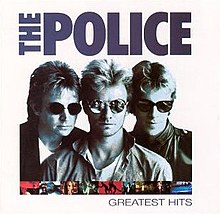Greatest Hits (Police album)
| Greatest Hits | ||||
|---|---|---|---|---|
 |
||||
| Greatest hits album by the Police | ||||
| Released | September 1992 | |||
| Length | 67:48 | |||
| Label | A&M | |||
| the Police chronology | ||||
|
||||
Greatest Hits is a compilation album of songs by the Police, released in 1992. It is the band's second compilation album following Every Breath You Take: The Singles and the first release after the official split up in 1986. In contrast with its predecessor, it features all the singles released by the band, with the exception of "Fall Out" (the only Police's single not to be released with A&M) and "Bring on the Night" (previously released only for the French, German and American market). The original version of "Don't Stand So Close to Me" was used instead of the 1986 version. The album also includes "Tea in the Sahara", which was never released as a single before but was very popular with the band's fans. The cover photograph was by Duane Michals and it was taken at the time of the Synchronicity album. The inner sleeve featured a collage of pictures of the band shot by different photographers during their career, including Miles Copeland, Adrian Boot, Akihiro Takayama, Anton Corbijn, Danny Quatrochi, Gabor Scott, Janette Beckman, Kim Turner, Michael Ross, Watal Asanuma and Andy Summers.
Although Greatest Hits was the first comprehensive retrospective of The Police's music, its performance suffered from its proximity to Every Breath You Take: The Singles. The album failed to chart in the US but spent 36 weeks in the UK Album Charts top 100, where it peaked at number 10. It also charted at number 1 on Official New Zealand Music Chart and on the French Music Charts. The album came out shortly after Sting's solo album The Soul Cages, prompting David Sinclair to point out in his review in Q Magazine that "Copeland and Summers were far more than a passive vehicle for Sting's songs. As powerful personalities and assertive musicians in their own right, they gingered up Sting's basic ideas while putting the brakes on his tendency to earnest excess."
...
Wikipedia
